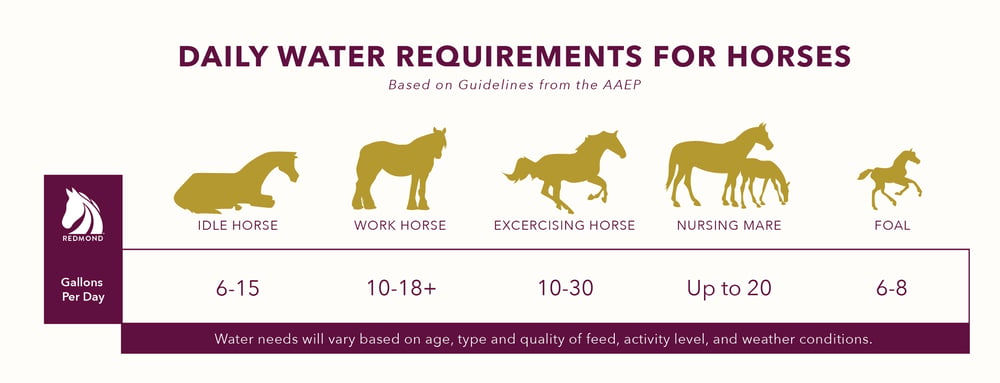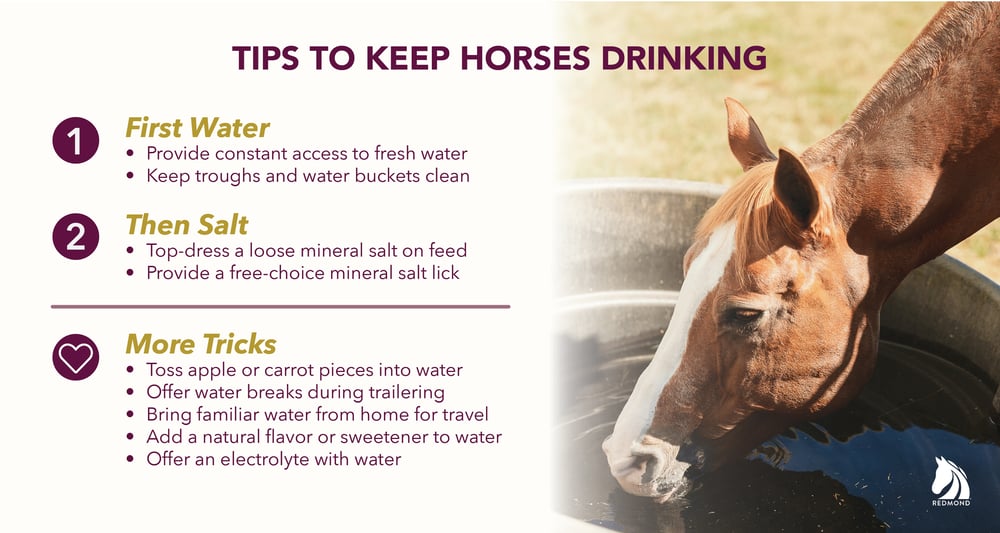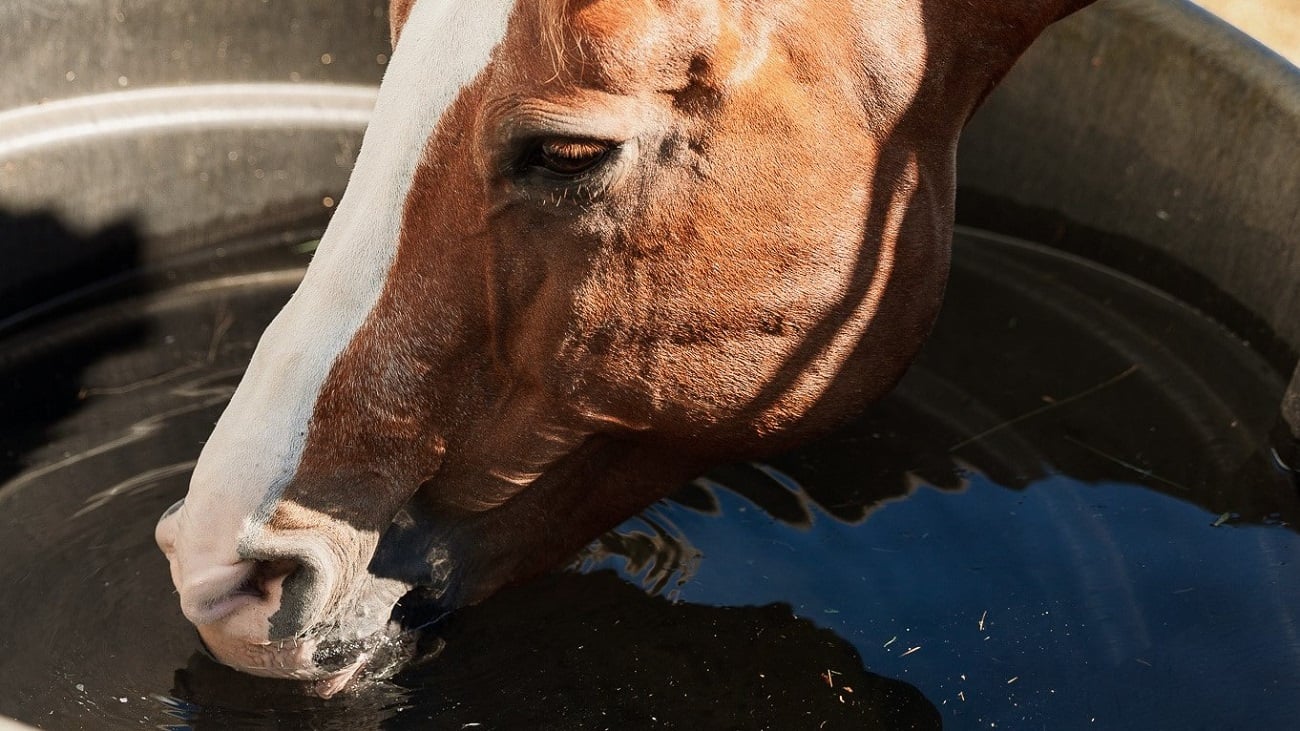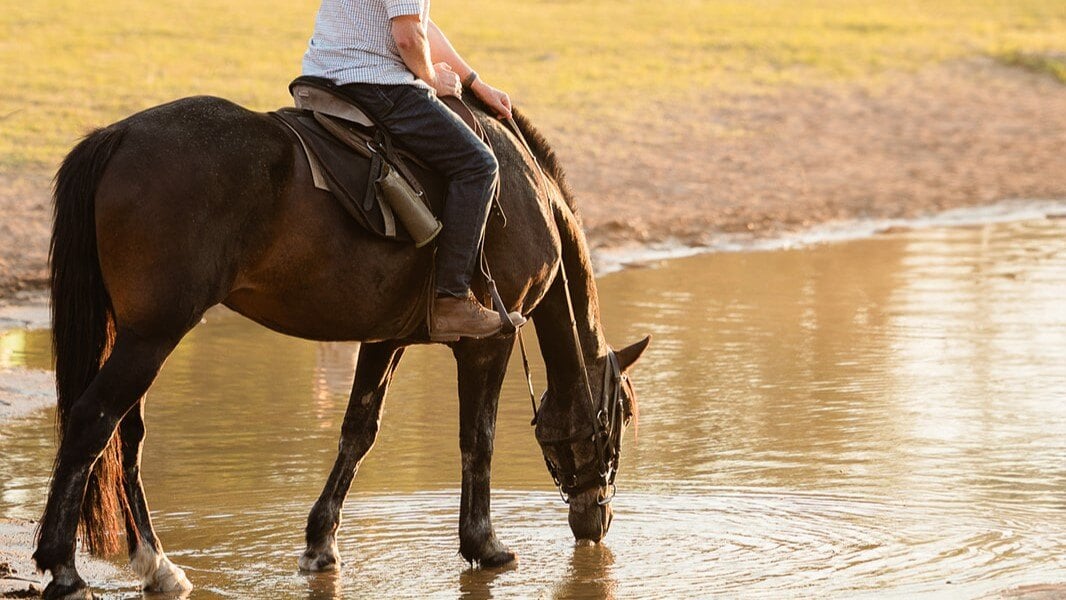Get Your Horse Drinking Water with 10 Hydration Hacks
July 26, 2023
FAQ About Horses & Water | Tips to Get Your Horse Drinking
Did you know a horse is over 60% water? That includes 85% of its brain, 75% of muscles, and even 30% of bone. That’s a lot of life-sustaining H2O flowing through your four-legged friend!
Water plays an essential role in every function of the equine body. In fact, it’s a horse’s most vital nutrient. No matter what you do with your horse, or where, water must be a top priority.
In this blog, we answer your common questions about horses and water, cover the signs of dehydration, and suggest ways to get your horse’s nose in the trough more often.
Quick Content Guide
- Learn how much water a horse should drink per day
- Discover triggers that affect horses drinking
- Find out how long horses can go without water
- Learn how to do a horse dehydration test at home.
- 10 tips for helping horses drink more often
- See Redmond’s natural hydration supplements
Q. How Much Water Do Horses Drink a Day?
It’s an important question, but the answer is far from one-size-fits-all. No two horses are alike—and neither is their water consumption. Many factors influence daily water needs, like age, type and quality of feed, activity level, and weather conditions. The American Association of Equine Practitioners lists the following guidelines for daily water intake in horses:
- Idle horse in cool weather: 6-10 gallons, increasing up to 15 gallons in hot weather
- Workhorse: 10-18 gallons, with even higher needs in hot weather
- Nursing mare: up to 20 gallons to nourish both herself and her foal
- Foal: 6-8 gallons to meet high fluid requirements
- Exercising horse: 10 gallons-30 gallons, based on conditions
Understanding your horse's unique hydration needs and monitoring how much it drinks daily will help you foster a healthier horse.

Q. Why Won’t My Horse Drink Water?
Your horse’s health is vital, and hydration is key—but horses are sometimes fussy about water. Some have picky palettes and others are affected by environmental triggers. Here are factors that can decrease the desire to drink or cause horses to stop altogether:
- Trailering: The rigors of hauling, leaving paddock pals, or dealing with a new environment.
- Stress: A new competing or training schedule or other anxiety-inducing situations.
- Weather Changes: Sudden extreme heat, cold, or unsettling storms.
- Water Flavor: Water that tastes different from what they frequently drink.
- Water Smell: Unfamiliar odors emanating from water or containers (like switching from a familiar metal water container at home to a plastic bucket on the road).
- Water Temperature: Icy or overly warm water.
- Dirty Water: Unclean or stagnant water that may harbor bacteria and algae.
- Water Acidity: Horses are less likely to drink acidic water (anything below 7.0 pH).
Q. How Long Can a Horse Go Without Water?
Every horse owner should know how much and how often their horse drinks. A horse refusing or denied access to water can quickly escalate into a scary situation. How long a horse can live without water varies based on factors like environment, activity, age, and health.
Most horses will become dangerously dehydrated and susceptible to death within just a few days but may last up to five days. However, as a rule, a horse should never go longer than 3-5 hours without access to water. Avoid dehydration by encouraging your horse to drink often and never letting the trough run dry!
Q. What Happens if a Horse Doesn't Drink Enough Water?
Various health issues stem from a horse not drinking enough—some potentially life-threatening. Here are consequences of inadequate water consumption and dehydration in horses:
- Impaired digestion and colic, a painful and potentially life-threatening condition
- Reduced feed intake and weight loss
- Electrolyte imbalances and decreased blood circulation
- Lower stamina and exercise performance
- Urinary stones and other urinary tract problems
- Weakened immune system and increased infections and illness
Q. What Are the Signs of Dehydration in Horses?
Even with consistent access to water, many horses may refuse to drink enough and can become at least mildly dehydrated. If left unchecked, it can lead to serious health issues. Learn to recognize these five signs of a dehydrated horse and act quickly to rehydrate when needed.
1. Elevated Heart Rate
The facial artery on the bottom side of the jaw, in the shallow groove beneath the last cheek tooth, is the easiest place to check a pulse. Normally, a horse’s heart rate is around 32-36 beats per minute. While your horse is resting, try to count a pulse for 60 seconds. Or if it’s restless, try 30 seconds and double the result. A resting heart rate higher than 60 may indicate dehydration.
2. Increased Respiratory Rate
Count respiration rate by watching your horse’s chest move in and out or by feeling the air coming from its nostrils. Typically, a horse takes 8-12 breaths per minute. However, a dehydrated horse often takes more frequent, shallow breaths as its body tries to shuttle resources from one system to another.
3. Slow Capillary Refill
Delayed capillary refill time is another sign of horse dehydration. To check capillary refill, gently press on the gum near the upper teeth. The skin should turn white as you press, but the pink color should return quickly when you release. Normal refill time for horses is about two seconds. If it takes longer for color to return, your horse might be dehydrated.
4. Reduced Skin Elasticity
Depleted fluids or electrolytes can cause a horse's skin to lose elasticity. A simple way to check for dehydration is to pinch the skin along your horse's back or lower chest. A well-hydrated horse’s skin will quickly spring back into place. If the skin stays up like a ridge or returns slowly to its regular shape, you should take action to hydrate.
5. Dry Eyes & Gums
The eyes and gums of a horse that drinks regularly should appear moist and shiny. Excessively dry or red gums, or dry or dull eyes, indicate your horse is dehydrated and may be using up available fluids for core activities.
You Can Lead a Horse to Water.... Or Try 10 Other Effective Ways to Get a Horse to Drink!
The familiar adage says you can lead a horse to water but can't make it drink. These helpful tips can help your horse drink no matter where you are. Let’s start with salt first.
Provide Salt Daily
Wondering how to get a horse to drink water more often? Don’t skip the salt! It plays a vital role in hydration by triggering thirst. Without adequate salt intake, many horses will not consume enough water. Here’s why.
Horses' brains watch sodium levels and tell them to stop drinking when levels are low to avoid losing too much sodium. When sodium levels are normal, however, horses experience natural thirst signals and are inclined to drink water more regularly.
Feeding horses the right dose of salt will encourage drinking and proper hydration. You can ensure horses receive adequate salt by:
- Top-dressing a loose mineral salt on feed
- Providing a quality free-choice mineral salt lick

Horse Hydration Tips & Tricks
Need more suggestions for getting picky drinkers to the trough? Below are healthful, practical, and creative ideas to keep your horse drinking water at home or on the road.
- Provide Access to Fresh Water: Ensure that your horse always has access to fresh, clean water. Inspect automatic waterers daily to ensure they are functioning correctly and providing ample water.
- Keep Containers Clean: Clear water containers of debris and change water frequently. If you’re using a bucket, rinse it out daily. Troughs and large containers should be cleaned with a bristle brush every other week to clear algae and contaminants.
- Maintain a Moderate Temperature: Horses like water that is around 68°F. In winter, try filling your horse's bucket with tepid water or add a heater to troughs. If it's hot outside, keep water in the shade.
- Sprinkle Loose Salt on Feed: Top-dress a loose mineral salt on feed to encourage drinking. You can even rub a small amount over your horse’s tongue to help trigger immediate thirst.
- Provide a Free-Choice Salt Lick: Hang a salt rock on a fence near your horse's water source. It encourages drinking, makes for an enticing toy, and stays cleaner than on the ground.
- Tempt with Tasty Treats: Toss a few apple or carrot pieces into a water bucket to pique your horse’s interest and encourage them to take a sip.
- Offer Water Breaks During Trailering: Offer horses water every two to three hours when hauling. Experienced trekkers say horses are more likely to drink after the trailer has parked for 15-20 minutes and horses have had a chance to rest.
- Bring Familiar Water for Horses: Bring 5-10 gallons of water from home while on the road. This helps your horse transition gradually to “away water” and lessens the likelihood of being off-put by unfamiliar smells or tastes.
- Flavor the Water: Consider adding a natural flavor, electrolyte, or sweetener like apple juice to water several days before a trip. Use the same flavor or electrolyte at your destination to hide the taste of unfamiliar water and provide a comforting taste of home.
Redmond Hydration Products Help Horses Drink
Redmond salt supplements are an excellent trigger to help horses stay hydrated and healthy. Jo Green had a dehydration scare after picking up a new horse. Read her story of using Daily Red Crushed to get her horse drinking water again.
It’s hard to teach an old dog new tricks. I hate it when I’m the “old dog.”
Recently I acquired a new horse for my Equine Assisted Psychotherapy program. We drove from Salt Lake City, Utah, to Redmond, Washington, to pick her up.
We brought five gallons of water from her barn to aid the water transition, but it didn’t help. Neither did the other tried-and-true “tricks” I’d learned. She wouldn’t touch her water and was really drawn in.
I was worried and reached for my cell to call the vet. As I dialed, I looked down and saw a package of Crushed mineral salt sitting next to my bag of Daily Gold. While I was a recent convert to Daily Gold, I’m embarrassed to admit this ol’ dog had not yet opened or tried the Crushed.
Well, I’ll just try this, I thought and sprinkled it over a small amount of oats as I called my vet. Twenty minutes later I canceled the call as our new partner started drinking. Within a few hours, she looked noticeably better, and her situation kept improving.
Later, the vet dropped by anyway, just to check. He did all his vet things and said she looked great and to keep giving her salt. Thanks, Redmond! I love it when I learn effective new tricks.
— Jo Green

Keeping your horse hydrated is simpler with Redmond. We have a full line-up of nature-made mineral salt products to help horses drink at home or on the road. Click below to shop our supplements or try a hydration sample pack at half price today. Purchasing with Redmond is risk-free with our love it or return it guarantee!
Learn More
- Salt block, mineral block, or rock salt for horses? Learn which is best!
- Learn when to feed horses salt or electrolytes to encourage fluid balance and hydration.
© Redmond Equine 2023. All rights reserved.
Related posts

How Taylor Got Her Dehydrated Horse to Drink | A Redmond Story
Is your horse dehydrated? Taylor's horse Jin exhibited signs of dehydration in horses. She used Redmond supplements to get her horse to drink more...
December 18, 2024

How to Hydrate a Horse | Tips from Julie Goodnight
Some horses just won't drink enough water. So, how do you keep a finicky horse hydrated? EducatorJulie Goodnight provides helpful tips on horse...



